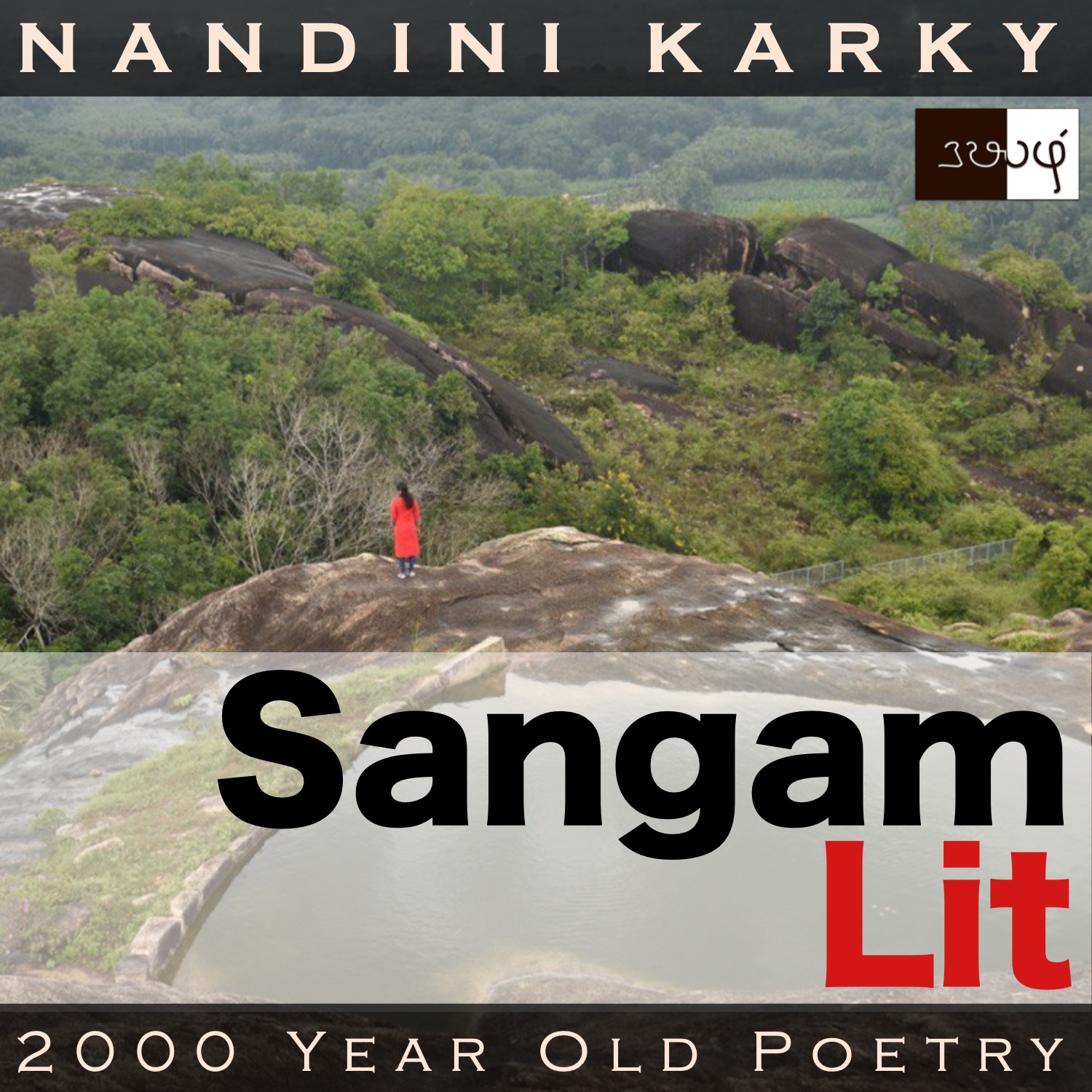Podcast: Play in new window | Download
Subscribe: Apple Podcasts | Spotify | Amazon Music | Android | iHeartRadio | Email | TuneIn | RSS | More

In this episode, we get drenched in the inner life depicted in Sangam Literary work, Natrinai 51, written by Peraalavaayar, a poet from the ‘Aalavaai’ region of ancient Madurai. This poem is set in the ‘Kurinji’ landscape or the mountainous regions and speaks in the anguished voice of the lady to her confidante, as the man listens nearby.
யாங்குச் செய்வாம்கொல்-தோழி! ஓங்கு கழைக்
காம்புடை விடர் அகம் சிலம்ப, பாம்பு உடன்று
ஓங்கு வரை மிளிர ஆட்டி, வீங்கு செலல்
கடுங் குரல் ஏறொடு கனை துளி தலைஇப்
பெயல் ஆனாதே, வானம்; பெயலொடு
மின்னு நிமிர்ந்தன்ன வேலன் வந்தென,
பின்னு விடு முச்சி அளிப்பு ஆனாதே;
பெருந் தண் குளவி குழைத்த பா அடி,
இருஞ் சேறு ஆடிய நுதல, கொல்களிறு
பேதை ஆசினி ஒசித்த
வீ ததர் வேங்கைய மலை கிழவோற்கே?
Relishing the little drops of rain first, we find the verse is a case study in ‘ethugai’ with its ‘யாங்கு’ – ‘ஓங்கு’, ‘காம்பு’ – ‘பாம்பு’, ‘ஓங்கு ‘ – ‘வீங்கு’ occurring in the same line as wells as ‘மின்னு’ – ‘பின்னு’ and ‘பெருந்’ – ‘இருஞ்’ occurring in successive lines. This makes me wonder why ancient Tamil poets have endowed the second letter with all this emphasis. My mind seems to whisper that this has something to do with the art of subtlety. A rhyme in the first letter or the last somewhat clamours for attention whereas when the rhyme dances in the second, a soft and subtle melody is evoked. I loved the phrase ‘கனை துளி’ that refers to a raindrop, the reason being that the direct translation would be a ‘heavy drop’. Thus, the intensity of the downpour is captured concisely with these two little words. The phrase ‘பெயல் ஆனாதே, வானம்’ meaning ‘the sky became rain’ highlights the severe weather again. ‘வேலன்’, the priest who cures young women of their ailments, makes an appearance here. We also catch sight of the ‘களிறு’ or the male elephant, somewhere in the proximity of the ‘வேங்கை’ or the Indian kino tree, with its bright yellow flowers!
Feeling the rain fall on our skin, we perceive the situation as one wherein the lady is in the midst of an uncomfortable situation at home and knowing that her man is listening nearby, she says to her confidante,“What shall I do, my friend? Making those mountain ridges packed with tall bamboo stalks resound, attacking snakes and making them writhe on tall rocks, with a harsh voice that travels afar, thick drops fall from the sky that has become one with the rain. With these rains, as if lightning has come in person, Velan, the priest, has arrived too. Now, there is no other go but to wear the flowers on my braided hair for the ritual to begin. How can I do this, when my heart is one with the lord of the mountains? A land where, a mad elephant stomps on wild jasmine flowers and with its black, mud stained forehead attacks and breaks down the ‘asini palaa’ tree, but stands away scared by the flower-filled ‘vengai’ tree!” What is the connection between rain showers, priests and flowers, you may ask! Indeed, this verse does seem difficult for us to connect to, as it’s filled with ancient social customs and hidden meanings. But, let’s try to unravel the essence!
To truly taste the rain and make it part of us, we need to delve deeper into the story painted by these words. The first thing to grasp is that it’s the season of heavy downpour. There’s the roaring thunder shaking the bamboo stems in the mountain ridges and also afflicting the snakes with much pain that they writhe on the boulders. By referring to the treacherous weather, the lady presents the reason for her man’s absence. Because of all these dangers, he has not come to see her and be with her. Thus, pining for him, she loses her health. In turn, mother gets worried about her and thinking it’s the act of god Muruga, she summons ‘velan’, the priest, to perform the ritual to cure her daughter. And, what’s special about the ritual? In this ritual apparently, the affected woman has to wear flowers on her head, as an invitation for that god to descend on her and cure her. But, there’s a catch! The catch is in the lady’s heart. Once a lady from those times decides the man of her life, it’s as good as they are married and it was not considered chaste for such a woman to wear flowers and to dress herself up, in the absence of her man. So, now you know why she’s torn between having to wear that flower on her head and being bound by his love and her chastity!
That’s not all! Hidden in the reference to the elephant of the mountain country, lies a message meant for the man listening nearby. The stomping of the elephant on jasmine flowers would refer to the man’s union with her. The attack on the breadfruit tree signifies how his absence has destroyed her health. Finally, there’s the line which says the elephant stands away, almost scared of the ‘vengai’ or the Indian kino tree, because in full bloom with its yellow flowers, this tree is said to resemble a tiger! This act of the elephant is a metaphor for the man’s hesitation in pursing marriage after all these events have unfolded. Thus, a subtle nudge by the lady to the man to slay her anguish and seek her hand in marriage. The seemingly unrelated elements thus join hands to soak us in the nuances of inner life, two thousand years ago.




I can smell the rain drops in this poem 😍😍 சங்க கால மண் வாசனை ❤️